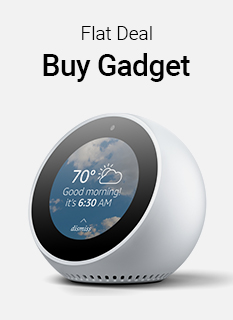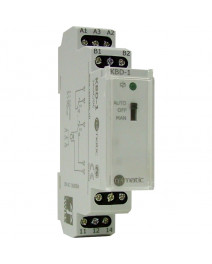Digital coupling modules
-
Digital Coupling Module KBD-1
€23.00In building automation, as well as in process control, it is very practical to switch a relay contact on or off during commissioning and service. This means operating a valve, a pump, heating or ventilation in manual mode. With the switch feedback, the controller is informed whether the coupling module is in automatic or manual mode.
The KBD-1 coupling module contains 1 circuit with 1 changeover contact for a load of 12 A / 250 V AC, which can be controlled with 24V AC/DC.
-
Digital Coupling Module KBD-1/L
€30.28Switching on lights can lead to very high inrush
current peaks.
A closing contact can bounce 3 to 7 times until it has
closed completely. This creates a light arc which can
melt the contact surface. Micro-welding can take
place when the contact cools down (contact sticks).
To prevent sticking of the contact, relays with a
preceding tungsten contact are used.
Inrush current peaks for filament lamps of 165 A /
max. 20 ms, or for fluorescent lamps of 800 A / max.
200 µs can be switched with these.
-
Digital Coupling Module KBD-1/M
€23.00• 1 switching circuit with 12 A The switching circuit is capable of switching an output of 12 A /250 V AC. • Minus activation For the new generation of controllers with minus outputs, the A3 activation is activatable with a minus.
• AUTO-OFF-ON with feedback The switching circuit can switch to automatic or manual mode. In automatic mode the contact with feedback is closed, therefore a logic 1 results on the controller. Multiple feedbacks can be connected in series.
• DIN 45 mm housing The standardised housing enables the KBD-1 to be installed by means of a 45 mm cut-out behind the covering, it only requires a width of 17.5 mm for this. It only requires a width of 17.5 mm.
-
Digital Coupling Module KBD-2
€40.62In building automation, as well as in process control, it is very practical to switch a relay contact on or off during commissioning and service. This means operating a valve, a pump, heating or ventilation in manual mode. With the switch feedback, the controller is informed whether the coupling module is in automatic or manual mode.
The KBD-2 coupling module contains 2 circuits, each with 1 changeover contact for a load of 12 A / 250 V AC, which can be controlled with 24V AC/DC.
-
Digital Coupling Module KBD-2/L
€55.38Switching on lighting fixtures can result in very high inrush currents. A closing contact bounces 3-7 times until it closes completely. This creates an arc that can melt the contact surface. If the closed contact cools down, micro-welding can occur (contact sticks).
To avoid contact sticking, relays with a leading tungsten contact are used.
This allows switch-on peaks of 165 A / max. 20 ms for incandescent lamps, or 800 A / max. 200 µs for fluorescent lamps.
An 8-pole connection comb is available for faster wiring of the supply A1 – A2.
-
Digital Coupling Module KBD-2/M
€40.61• 2 independent circuits with 12 A
Every separately controllable switching circuit is
capable of switching an output of 12 A / 250 V AC.
• Minus activation
For the new generation of controllers with minus
outputs, the A3 and A4 activations are activatable
with a minus.
• AUTO-OFF-ON with feedback
The switching circuit can switch to automatic or
manual mode. In automatic mode the contact with
feedback is closed, therefore a logic 1 results on
the controller. Multiple feedbacks can be connected in series.
• DIN 45 mm housing
The standardised housing enables the coupling
module to be installed by means of a 45 mm cutout behind the covering, it only requires a width of
17.5 mm (8.75 mm per channel) for this.
-
Digital watchdog WDR-2
€71.752-channel digital watchdog coupling module with predefined switching action in the event of a controller failure.
-
DIN relay coupler DRK-1/L
€24.90Switching on lighting fixtures can result in very high inrush currents. A closing contact bounces 3-7 times until it closes completely. This creates an arc that can melt the contact surface. If the closed contact cools down, micro-welding can occur (contact sticks).
To avoid contact sticking, relays with a leading tungsten contact are used.
This allows switch-on peaks of 165 A / max. 20 ms for incandescent lamps, or 800 A / max. 200 µs for fluorescent lamps.
An 8-pin connection comb is available for quick wiring of the negative pole A2.
-
DIN relay coupler DRK-2/L
€44.41Switching on lighting fixtures can result in very high inrush currents. A closing contact bounces 3-7 times until it closes completely. This creates an arc that can melt the contact surface. If the closed contact cools down, micro-welding can occur (contact sticks).
To avoid contact sticking, relays with a leading tungsten contact are used.
This allows switch-on peaks of 165 A / max. 20 ms for incandescent lamps, or 800 A / max. 200 µs for fluorescent lamps.
An 8-pin connection comb is available for quick wiring of the negative pole A2.
-
ISR1-316/L-230 Coupling module
€69.41The ISR1-316/L contains 3 make contacts with advanced tungsten contacts.
Switching on lighting fixtures can result in very high inrush currents.
A closing contact bounces 3-7 times until it closes completely. This creates an arc that can melt the contact surface. If the closed contact cools down, micro-welding can occur (contact sticks).
To avoid contact sticking, relays with a leading tungsten contact are used.
This allows switch-on peaks of 165 A / max. 20 ms for incandescent lamps, or 800 A / max. 200 µs for fluorescent lamps.
The installation relay has a built-in protection diode and interference suppression capacitor. Supply voltage: 230VAC










